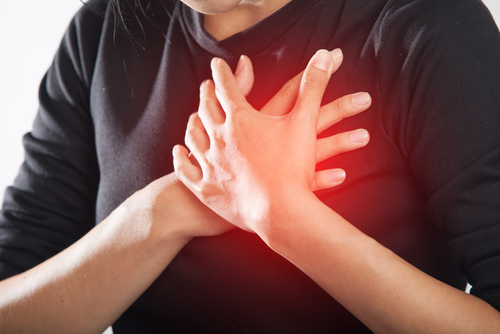Paras Hospitals study: 70% women who die of sudden cardiac arrest have no history of heart disease
PTI May 08, 2018
A recent study conducted by Paras Hospitals, Gurgaon, found that 70% of women who die from sudden cardiac arrest have no history of heart disease.

Women with lower levels of calcium in the blood are more likely to experience sudden cardiac arrest than those with higher calcium levels. Cardiac arrest is one of the leading causes of death in India and kills more people than any single cancer. Increased intake of food like cheese, late dinners are the major risk factor for heart diseases.
Globally 1 in every 4 women dies of heart failure as women are less likely to get treatment and diagnosis of the disease. Each year about 4,25,000 women have a stroke, which is 55,000 more as compared to men. Normally chances of sudden cardiac arrest are more in people who are already suffering from heart diseases. But, the cases are no less in people who look absolutely healthy have no known history of heart disease. Nowadays, cardiac arrest is more common in women than it may seem.
Dr D. K. Jhamb, Director & HOD Cardiology says, "It is estimated that approximately 3,00,000 individuals die of sudden cardiac arrest annually in India. However, 70% of women who die of sudden cardiac arrest have no history of heart disease before their cardiac arrest. Most of the women don't even know that they have already suffered one or two heart attacks in past until they visit doctors. Being healthy is no insurance against heart diseases. Today, heart attacks are striking at a younger age, making those in their 30s and 40s the new high-risk categories, possibly due to high-pressure lifestyles and low levels of calcium.
Many people think cardiac arrest and heart attack are the same but it's not so. The basic difference between both is that during a heart attack, blood flow stops in a particular part of the heart and thus, damages it. However, in cardiac arrest, it's an electrical problem where the heart stops working altogether leaving the person with no pulse and unconscious. The sudden cardiac arrest is when the heart unexpectedly stops beating, restricting blood flow to all the other vital body parts. If proper medical attention is not received, this can result in the death of a person within a few minutes.
Commenting on the major causes and symptoms of heart diseases, Dr Amit Bhushan Sharma, Unit Head and Associate Director -Interventional Cardiology says, "Symptoms in men are clear than in women. In men, the heart attack would mean extreme pain and break out in cold sweats. In women, heart attack can be much more frequent and smaller. Eight out of 10 times the causes of cardiac arrest in women is a blockage in the heart. Lower calcium levels were independent with an increased risk of sudden cardiac arrest in women. Women with calcium levels less than 8.95 mg/dL were 2.3 times more likely to have sudden cardiac arrest compared with those with levels higher than 9.55 mg/dL. Also, in rural areas, the biggest reason behind the growing numbers and decreasing age in heart-related ailments is low awareness of risk factors."
Unhealthy lifestyle and changing food habits such as increased intake of cheese, food rich in fats and carbohydrates, late dinners are some of the major factors of heart diseases. In addition to that low physical activity, consumption of alcohol, smoking and high blood pressure in women accelerates the risk of heart disease in women.
Dr Amit Bhushan Sharma, Unit Head and Associate Director -Interventional Cardiology says, "Unlike men, women too have some added responsibility, like looking after her kids, their parents and family. While trying to keep up everything they tend to forget to keep a check on their own health and thus ends up living with poor health. They should have a regular check-up and should maintain a healthy lifestyle. Taking a proper diet and doing a regular exercise will help to lower the level of cholesterol in the blood and thus reduce the risk of heart disease." It is important to educate that no one can be completely safe from the risk of cardiac arrest and it is important to check the level of calcium and to keep the risk factors such as high blood pressure, diabetes, and obesity at a minimum.
-
Exclusive Write-ups & Webinars by KOLs
-
Daily Quiz by specialty
-
Paid Market Research Surveys
-
Case discussions, News & Journals' summaries